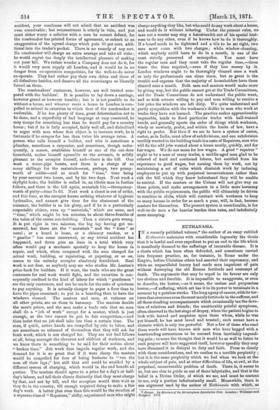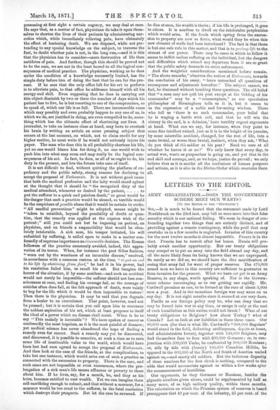EUTHANASIA.
IN a recently published volume,* the author of an essay entitled Euthanasia maintains with considerable ingenuity the thesis that it is lawful and even expedient to put an end to the life which is manifestly doomed to the sufferings of incurable disease. It is a thesis which has been often defended, and sometimes carried into frequent practice, as, for instance, in Rome under the Empire, before Christian ethics had asserted their supremacy, and when an unparalleled luxury had made men impatient of pain without destroying the old Roman fortitude and contempt of death. The arguments that may be urged in its favour are only too obvious and forcible. It is impossible to exaggerate, or even to describe, the horror,—as it seems, the useless and purposeless horror,—of suffering, which art has it in its power to terminate in a moment by a painless stroke. The long agony of cancer, with its tor- tures that overcome even themost manly fortitude in the sufferer, and all those shocking accompaniments which occasionally tax the devo- tion of relatives and friends ; the unutterably painful symptoms, often observed in the last stage of dropsy, when the patient begins to look with hatred and suspicion upon those whom, while he was yet himself, he has most loved and trusted ; such scenes have a rhetoric which is only too powerful. Not a few of those who read these words will have known sick men who have begged with a heartrending earnestness to be rescued from inevitably impend- ing pain ; to some the thought that it would be as well to listen to such prayers will have suggested itself, however speedily they may have dismissed it as disloyal to duty and faith. Press us closely with these considerations, and we confess to a terrible perplexity ; but it is the same perplexity which we feel when we look at the whole subject of pain, and at other difficulties of life, at evil, at the perpetual, unanswerable problem of death. There is, it seems to us, but one clue to guide us out of these labyrinths, and that is the belief in a Divine Order, of which we see, and must be content to see, only a portion infinitesimally small. . Meanwhile, there is one argument used by the author of Euthanasia with which, as * Essays. By Members of the Birmingham Speculative Club. London : Williams and Norgate. 1870 possessing at first sight a certain cogency, we may deal at once. He says that, as a matter of fact, physicians do take it upon them- selves to shorten the lives of their patients by administering nar- cotics which, while immediately relieving pain, have ultimately the effect of hastening death. We are disposed, while not pre- tending to any special knowledge on the subject, to traverse the fact, to doubt whether pain is not, in the long run,—and it is this that the physician has to consider—more destructive of life than antidotes of pain. And further, though this should be proved not to be the case, we are not in the least bound to all the logical con- sequences of medical practice. The physician, working as he does under the condition of a knowledge necessarily limited, has the simple duty before him of doing the best that he can for the pre- sent. If he sees that the only office left for his art to perform is to alleviate pain, to that office he addresses himself with all his energy and skill. Even supposing that he does in carrying out this object diminish by two or three the number of days which his patient has to live, he is but resorting to one of the compromises, so to speak of, which our life is so full. There are innumerable cases which may possibly and even probably happen to any one of us, in which we do, are justified in doing, are even compelled to do, some- thing which has the ultimate effect of shortening our lives. A journalist, to take an instance close at hand, may have to overtask his brain by writing an article on some pressing subject that occurs at the last moment, on which, not to claim credit for any higher motive, he must write if he would not seriously injure his paper. The man who does this in all probability shortens his life, yet no one would blame him for doing it, no one would wish to push him into what may seem and may really be the logical con- sequences of his act. In fact, he does, as all of us ought to do, his duty in the present, and lets the future take care of itself.
It is not difficult to find, without quitting the platform of ex- pediency and the public safety, strong reasons for declining to accept the proposal of Euthanasia. It is not without good cause that both the medical profession and the laity would stand aghast at the thought that it should be "the recognized duty of the medical attendant, whenever so desired by the patient, . . . . to pat the sufferer to a quick and painless death," so great would be the danger that such a practice would be abused, so terrible would be the suspicions of possible abuse that it would be certain to evoke. "All needful precautions" might be adopted, means might be "taken to establish, beyond the possibility of doubt or ques- tion, that the remedy was applied at the express wish of the patient ;" still you could not but be imposing on patient, on physician, and on friends a responsibility that would be abso- lutely intolerable. A sick man, his temper irritated, his will enfeebled by suffering, is called upon to make in a matter con- fessedly of supreme importance an irrevocable decision. The Roman followers of the practice commonly avoided, indeed, this aggra- vation of its terror. When, for instance the poet Saute Italicus, "worn out by the weariness of an incurable disease," resolved, inaccordance with a common custom at the time, "to put an end to his life by abstaining from food," he had it in his power, had his resolution failed him, to recall his act. But imagine the horror of the situation, if by some accident—and such an accident would not surely be impossible—the sufferer should not lose con- sciousness at once, and finding his courage fail, as the courage of suicides often does fail, at the felt approach of death, were vainly to beg for the life which it would be then impossible to restore ! Then there is the physician. It may be said that you degrade from a healer to an executioner. That point, however, need not be pressed ; but it is certain that you call upon him to renounce the noblest aspiration of his art, which at least proposes to itself the ideal of a power which no disease shall resist. When is he to say "This malady is incurable" ? We have spoken of cancer as confessedly the most hopeless, as it is the moat painful of diseases; yet medical science has never abandoned the hope of finding a remedy even for cancer. Such a remedy may yet be discovered, and discovered, it is possible to conceive, at such a time as to save some life of inestimable value to the world, which would have been lost had men agreed to accept the proposal of Euthanasia. And then look at the case of the friends, at the complications, to take but one instance, which would arise out of such a practice as connected with the succession to property. There is the case, and such cases are not impossible or even uncommon, where the pro- longation of a sick man's life means affluence or poverty to those about him. If he lives, say, for a month, he, and they as his heirs, becomes entitled to vast wealth. Yet we can imagine them self-sacrificing enough to submit, and that without a murmur, for a murmur would be too cruel to the sufferer, to the fatal resolution which destroys their prospects. But let the case be reversed. If he dies at once, his wealth is theirs ; if his life is prolonged, it goes to others. It is needless to dwell on the intolerable perplexities which would arise. If the feuds which spring from the succes- sion to property are now so fierce, what would they be when this new element of strife had been introduced? The fact is that there is but one safe rule in this matter, and that is to prolong life to the utmost of our power. There may be cases in which to follow it seems to inflict useless suffering on the individual, but the dangers and difficulties which attend any departure from it are so great that the public safety demands its strict enforcement.
And the weightier considerations mentioned before remain. "The above remarks," observes the author of Euthanasia, towards the conclusion of his essay, "leave untouched all questions of recompense and adjustment hereafter." The subject cannot, we feel, be discussed without touching these questions. The old belief that "a man may not quit his post except at the bidding of his commander" may be a "commonplace," as our speculative philosopher of Birmingham tells us it is, but it seems to us the expression of a noble and far-seeing wisdom. Those who tell us there is no such commander, your belief that he is waging a battle with evil, and that he will win the victory in the end, is a delusion,' have terribly cogent arguments at hand. What can we say, for instance, when they point to some fine intellect ruined, just as it is in the height of its promise, by some miserable accident, changed, for the rest of life, into a mere brutal, or worse than brutal, instinct, when they ask, What do you think of this soldier at his post ? Need we care at all whether he leaves it or no ?' We only know that every day, in actual war, waste as purposeless is going on, and yet that in the end skill and courage, and, as we hope, justice do prevail ; we only believe that as it is amidst all the confusions of human purposes and actions, so it is also in the Divine Order which overrules them all.



































 Previous page
Previous page